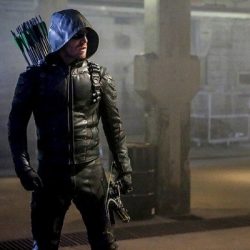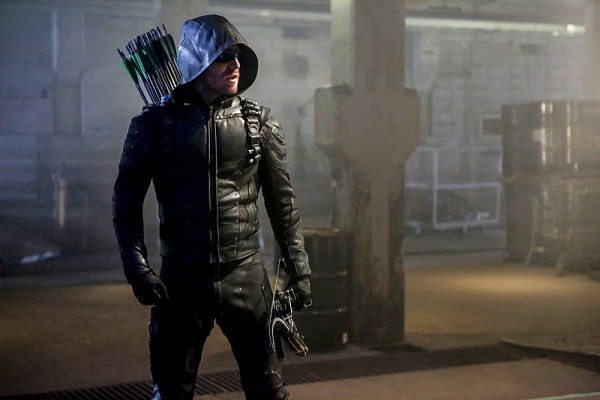
With Arrow returning from a lackluster season four, it’s absolutely paramount that team Arrow bring their A-game. In order to do this, they will have to thoroughly analyze with a fine-tooth comb the when, where and why they veered away from the exceptional writing of the previous two seasons.

The Emerald Archer is set to return within just a few days and as any DC fan can tell you, it’s going to be a very crucial season for Stephen Amell and the gang. Just a few short years ago, the show was a specimen of what all would-be comic book shows should strive to be. The tone, themes and general writing swagger was worthy of praise and celebration. It was a new day not only for fans of comic books but fans of television. The show was uniquely appealing and managed to garner an audience seemingly overnight. Everything was going great for Team Arrow. No one was aware of the enigmatic shift in tone that was creeping just around the corner. No one suspected that the mature themes would be replaced with juvenile displays of jealousy and adolescent narrative arcs that resemble more the diary of a confused hormonal teen than a seasoned writing room.
So what happened? Why the sudden change in writing style? Despite what internet trolls will have you believe, running a television show is no easy task and a myriad of different things can and do go wrong. So, these are questions that are not easily dissected with just a few words. To understand what went wrong, we will need to explore a few choice decisions that the producers made.
Let’s take a look at the producer’s original concept for Arrow. When Arrow was first announced, the writing team along with executive producer Greg Berlanti, wanted Arrow to be a “realistic” take on the vigilante; basically nothing that couldn’t happen in our world. With the “grounded in reality” idea at the center of the writing table, the writers laid out the foundation that would see dual origin stories that would serve for both Oliver Queen a.k.a. Arrow and his nemesis Slade Wilson a.k.a. Deathstroke. This was a writing choice that was both ballsy and a stroke of genius. Two characters sharing a parallel narrative that would eventually intersect and lead to an emotional finale. The dual parallel narratives of Oliver and Slade also served as a the cornerstone to introduce A.R.G.U.S. and the infamous Suicide Squad; two key ingredients that were to serve as the building blocks for future seasons. However, the latter never happened.
During this time, DC allegedly ripped Suicide Squad from the hands of the writing staff and Berlanti and the team were left scrambling. In the aftermath of the upheaval, you had a writing room that was left trying to re-sort a storyline that was nearly three years in the making. This mad-scramble to rework their narrative strategy is what led to the jarring effects of seasons 3. Now, just so it’s clear–I do not believe season 3 was terrible, but it did feel like the producers were still trying to figure out the direction of the story while shooting the episodes. The seamless and cohesive character arcs of seasons 1-2 were nowhere to be found. The show felt inconsistent and abrupt. To make matters worse, Arrow was no longer the new kid on the block. Much of the attention was about to be shifted elsewhere.
The Flash, although a fantastic addition to The CW, also had a hand in meddling with subsequent seasons of Arrow. The Flash’s writing room was stocked with writers from Arrow. Additionally, Andrew Kreisberg along with Berlanti were now splitting their time between The Flash and Arrow. Moving into the 4th season of Arrow, this would be something we’d see again, when both Guggenheim, Kreisberg and Berlanti split their duties across Arrow, The Flash, Legends of Tomorrow and Supergirl. Even though Wendy Mericle was promoted from co-producer/writer to an executive producer of Arrow, you now had producers that were working on just one show, splitting duties across four. When the wagon is over-packed, things are bound to start falling off–and they did.
Throughout the summer months, we’ve kept hearing that the show was going “back to its roots”–no more magic–”we’re going to have as season grounded in reality”, but magic and the fantastic was not the problem with the show. For those of us that have read Green Arrow and other DC properties, magic and the supernatural is something that comes with the territory. Plus how are you going to avoid the extreme superhero and comic book elements when you share a universe with shows like The Flash, Legends of Tomorrow and Supergirl? It’s not possible. The problem is not to avoid comic book elements, we watch Arrow because we want those moments. So what’s the fix?
There is a very simple remedy to the issues of the last two seasons. The problem simply comes down to not enough mayonnaise to spread across the entire sandwich. In order to fix the problem, you have to go back to the basics; the basics of writing. The attention must be on the script and the development of our heroes. It will be hard to do that when you have showrunners running a half dozen shows. However, minor tweeks would go a long way to fixing the problems that have bombarded the show. Things like Felicity and her jealous uncompromising judgments of Oliver needs to be reworked to reflect a realistic and likable person; because I’ve never witnessed a writing room assassinate a character like they’ve done with Felicity. They’ve managed to take a beloved character and turn her into an object of hate among most of the fandom. Story arcs based on throwaway d-list heroes that distract from the development of our lead character needs to stop. The writers need to spend less time delivering fan service easter eggs and focus on developing our leads. Last season Black Canary was nothing more than an abbreviated footnote, then she was killed off to deliver an emotionless and pointless gut punch to the audience.
In conclusion, I’d like to point out that the problems are few. All’s not lost. With the fantastic talent of the cast, the show can easily bounce back. It’s time to get back to the basics Team Arrow. I have faith in you.
